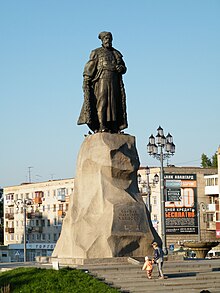Yerofei Pavlovich Khabarov

Yerofei Pavlovich Khabarov ( Russian Ерофей Павлович Хабаров ; * 1603 in Veliky Ustjug ; † 1671 ) was a Russian commander and colonist in the Far East . The city of Khabarovsk on the Chinese border and the urban-type settlement Yerofei Pavlovich in the Amur region are named after him.
Born the son of a farmer, he set out with his brother Nikifor to seek his fortune in Siberia. Around 1628 he worked as a merchant in the fur trade of Mangaseja , but had only modest success. Then he lived for a short time on agriculture on the Yenisei , then he ran mills and salt works on the Lena and finally a transport company on the Ilim Pass , an important trade connection.
Since after Poyarkov's company (1643–1646) the Amur region was considered a worthwhile destination (furs, urgently needed grain), Khabarov also hoped for fame and fortune and in the spring of 1649 equipped a train there. When he arrived in Transbaikalia the locals had left their villages and he learned of the horror Poyarkov had spread there. Expecting an easy victory over the settled Dauren, he offered himself to conquer this region for Russia, but also foresaw the intervention of the Chinese.
With around 200 men, horses and several small cannons, he entered Transbaikalia again in the autumn of 1650. The campaign was financed by the voivode in Jakutsk , D. Frantsbekow , partly from his own resources and supported with equipment, food, cannons, as well as 120 men and muskets. In the skirmishes with the Russians, the Dauren had little chance, as they had nothing equivalent to oppose the cannons mounted on sleds. Their fortifications were captured, the people massacred and the cattle driven away. In this situation, the people of the Amur Valley turned to Qing China for help, which quickly sent an army. In March 1652, the fighting was concentrated on the Achansk Fort (near today's Komsomolsk ) on the Amur, built by Khabarov , and Khabarov was unable to counter the 2,000 Chinese because they too had artillery and firearms. He escaped with minor casualties as they apparently only had orders to capture him at first.
During the retreat, his troops (he received reinforcements from Cossacks) showed little inclination to fight the Chinese and instead preferred to plunder the natives, so that he had to fight deserters . Eventually he was arrested by the Tsar's new commander, D. Zinoviev, and taken to Moscow. There acquitted, he became the commander of Ilimsk and disappeared from history in the 1660s. Incidentally, the Cossacks were driven out of the Amur region by a 10,000-strong Chinese army in 1655–1658, and Transbaikalia was so plundered at the time that its inhabitants were no longer able to produce grain.
literature
- Gudrun Ziegler: The eighth continent: The conquest of Siberia , Berlin 2005
- Sabine A. Gladkov: History of Siberia , Regensburg 2003
- B. Lincoln: Conquest of Siberia , Munich 1996
Web links
| personal data | |
|---|---|
| SURNAME | Khabarov, Erofei Pavlovich |
| ALTERNATIVE NAMES | Хабаров, Ерофей Павлович (Russian) |
| BRIEF DESCRIPTION | Russian navigator and explorer |
| DATE OF BIRTH | 1603 |
| PLACE OF BIRTH | Veliky Ustyug |
| DATE OF DEATH | 1671 |